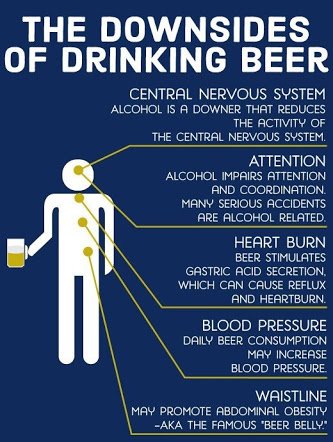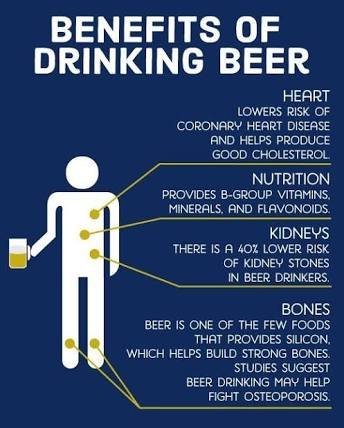Beer

Beer is one of the oldest and most widely consumed alcoholic drinks in the world, and the third most popular drink overall after water and tea.Beer is brewed from cereal grains most commonly from malted barley, though wheat, maize (corn), and rice are also used. During the brewing process, fermentation of the starch sugars in the wort produces ethanol and carbonation in the resulting beer.Most modern beer is brewed with hops, which add bitterness and other flavours and act as a natural preservative and stabilizing agent. Other flavouring agents such as gruit, herbs, or fruits may be included or used instead of hops. In commercial brewing, the natural carbonation effect is often removed during processing and replaced with forced carbonation.

Beer contains ethanol, an alcohol, which has short and long-term effects on the user when consumed. Different concentrations of alcohol in the human body have different effects on a person. The effects of alcohol depend on the amount an individual has drunk, the percentage of alcohol in the beer and the timespan over which the consumption took place, the amount of food eaten and whether an individual has taken other prescription, over-the-counter or street drugs, among other factors. Drinking enough to cause a blood alcohol concentration (BAC) of 0.03%–0.12% typically causes an overall improvement in mood and possible euphoria, increased self-confidence and sociability, decreased anxiety, a flushed, red appearance in the face and impaired judgement and fine muscle coordination. A BAC of 0.09% to 0.25% causes lethargy, sedation, balance problems and blurred vision. A BAC from 0.18% to 0.30% causes profound confusion, impaired speech (e.g., slurred speech), staggering, dizziness and vomiting. A BAC from 0.25% to 0.40% causes stupor, unconsciousness, anterograde amnesia, vomiting (death may occur due to inhalation of vomit (pulmonary aspiration) while unconscious) and respiratory depression (potentially life-threatening). A BAC from 0.35% to 0.80% causes a coma (unconsciousness), life-threatening respiratory depression and possibly fatal alcohol poisoning. As with all alcoholic drinks, drinking while driving, operating an aircraft or heavy machinery increases the risk of an accident; many countries have severe criminal penalties against drunk driving.
Consumption of small quantities of alcohol (less than one drink in women and two in men) is associated with a decreased risk of cardiac disease, stroke and diabetes mellitus.The long term health effects of continuous, moderate or heavy alcohol consumption include the risk of developing alcoholism and alcoholic liver disease. Alcoholism, also known as "alcohol use disorder", is a broad term for any drinking of alcohol that results in problems.It was previously divided into two types: alcohol abuse and alcohol dependence.In a medical context, alcoholism is said to exist when two or more of the following conditions is present: a person drinks large amounts over a long time period, has difficulty cutting down, acquiring and drinking alcohol takes up a great deal of time, alcohol is strongly desired, usage results in not fulfilling responsibilities, usage results in social problems, usage results in health problems, usage results in risky situations, withdrawal occurs when stopping, and alcohol tolerance has occurred with use. Alcoholism reduces a person's life expectancy by around ten years and alcohol use is the third leading cause of early death in the United States.No professional medical association recommends that people who are nondrinkers should start drinking wine.A total of 3.3 million deaths (5.9% of all deaths) are believed to be due to alcohol.
Beer keeps your kidneys healthy A Finnish study singled out beer among other alcoholic beverages, finding that it was better for your kidneys. In fact, each bottle of beer you drink reduces the risk of developing kidney stones by 40%.
Beer for better digestion Beer, and especially dark beer, contains up to one gram of soluble fibre* in each 30 cl glass - unlike wine, which doesn’t contain any fibre at all. Fibre plays an important role in intestinal transit (a fibre deficiency can cause gastric and intestinal disorders such as constipation or diarrhoea).
Beer to lower your bad cholesterol The fibre in beer can also help reduce your levels of LDL cholesterol, i.e. the “bad” type of cholesterol.
Beer can increase your vitamin B levels Beer contains several B vitamins (B1, B2, B6 and B12). A Dutch study found that beer drinkers had 30 percent higher levels of vitamin B6 than their non-drinking counterparts, and levels that were twice as high as those of wine drinkers. Beer is also a generous source of vitamin B12, an anti-anaemic factor not found in many foods.
Beer for stronger bones! A 2009 study concluded that the elevated levels of silicon in beer can contribute to higher bone density.
Beer as a cure for insomnia Lactoflavin and nicotinic acid, which are both present in beer, can promote sleep!
Beer reduces your risk of a heart attack Beer drinkers have a 40 to 60 percent reduced risk of suffering a heart attack compared with non-beer drinkers.
Beer helps prevent blood clots The ingredients in beer help prevent blood clots from forming.
Beer boosts your memory According to studies, beer drinkers are less likely to suffer from Alzheimer’s disease and dementia than non-beer drinkers.
Beer helps combat stress Researchers at the University of Montreal found that two glasses of beer a day can reduce work-related stress or anxiety.
Beer as a cold remedy Drinking warm beer is an excellent cold remedy! When barley is warmed up it improves blood circulation and helps you breathe when you feel congested. It also provides relief for joint pain and boosts your immunity. So, how do you prepare it? Heat a bottle of beer in a double boiler and then add four small teaspoons of honey.
Beer makes skin more beautiful Good news for women! Certain vitamins in beer can regenerate the skin and have a positive impact on pigmentation. Your skin becomes smoother and suppler.